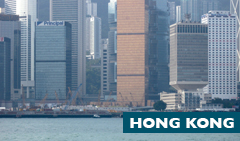Date/Time
Date(s) - 10 Oct 2017
8:30 am - 5:15 pm
Location
JW Marriott Hotel
Categories
Adapting to the changing in-house role can be a challenge. Increasingly, lawyers are expected to be much more actively involved in risk management, technology, strategy and project management — and they are looking to external law firms to help with the process of change.
This was the topic up for discussion at the plenary panel of the 19th annual In-House Community Congress in Hong Kong last week. Taking part in the session were Stephanie Cheung, chief legal officer for Melco Resorts & Entertainment; Crystal Lalime, managing director and head of global markets legal, Asia Pacific, at Credit Suisse; Tom Glasgow, investment manager, Asia, IMF Bentham; Martin Rogers, partner, Davis Polk; Chew Seng Kok, managing director, Zico Holdings; and moderator Patrick Dransfield, publishing director of Asian-mena Counsel and co-director of In-House Community.
The discussion was put into context by an engaging presentation on the rise of in-house lawyers and the changing nature of the role by former GC, Peter Connor, CEO and founder of Alternatively Legal.
Of all the changes facing the industry, the panellists agreed that technology, in particular, is moving at a pace that is likely to produce surprises during the next five to 10 years. But deploying tech solutions
within an in-house legal team can be daunting for lawyers with no background or expertise in managing such a process. How to get started?
Don’t begin with the technology, was Lalime’s recommendation. Instead, legal teams should think about the processes first. The most repetitive and mundane tasks are the low-hanging fruit for automation — and are also the jobs where your human staff add the least value. Having identified these processes, this will create a much easier starting point for a discussion with the tech staff within the organisation.
Rogers agreed that it is wasteful to tie up expensive lawyers with processes such as billing and document review, both for in-house and private practice teams.
Even so, not all investments in technology will work out. One panellist discussed an artificial intelligence solution for drafting seemingly simple contracts that achieved an underwhelming 98% inaccuracy after a year of development. The lesson: be willing to fail, but make sure that you fail fast and move on.
We also heard from the panel that the role of non-lawyers is becoming increasingly important for in-house teams. In particular, people with expertise in delivery, technology, stakeholder management
and project management. The ability to frame the team’s requirements in a way that business teams can understand can make a significant difference — and can be much simpler than trying to re-train lawyers to speak the language of business.
While many legal teams are trying to retain more work in-house, there are some new areas where it makes sense to rely on external firms. One example is regulatory risk forecasting. Law firms that
regularly speak to clients and regulators across your industry are well placed to provide this much more efficiently than can be done in-house — and it should be a standard service provided by firms, argued Rogers, while Chew stressed the importance of local insights in markets such as Asean.
The panel took to the stage after a welcome address by Emerico De Guzman, managing partner of Angara Abello Concepcion Regala & Cruz Law Offices, looking at recent legal developments in the Philippines.
Other highlights of the day for the over 400 attending In-House Community members included workshops covering a wide range of subjects, such as international arbitration, China’s Belt-and-Road
scheme, US enforcement of sanctions, crisis management, value creation through intellectual property and multidisciplinary platforms for alternative legal solutions in Asean.
Thanks to all our speakers and cohosts, including: Addleshaw Goddard; Angara Abello Concepcion Regala & Cruz Law Offices (ACCRALAW); AWA Asia; Axiom; Clyde & Co; Conyers Dill & Pearman;
Davis Polk & Wardwell; Debevoise & Plimpton; Fangda Partners; the Hong Kong International Arbitration Centre; Hughes-Castell; IMF Bentham; Lewis Sanders; Mintz Group; Oldham, Li & Nie
Lawyers; Taylor Root; and ZICO Holdings for their support of this In-House Community gathering.

Bookings
This event is fully booked.


